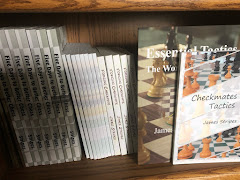My training method is eclectic and
varied. While I maintain some semblance of consistency in certain
activities, I frequently try new regimens or return to old ones. This
past week I have resumed efforts to play through entire games from
memory. There are a handful of games that I maintain in my long-term
memory though frequent use instructing beginning players, such as Legall
de Kermeur's only recorded game (see "My First Chess Book") and a variant of the same idea from Greco. Time spent revisiting Irving Chernev, 1000 Best Short Games of Chess
thirty-seven years after my first encounter with this text has quickly
planted several full games deep enough in memory that I can play through
them without reference to the game score.
In "Fingerprints,"
I noted, "Rashid Ziyatdinov advocates learning entire games
thoroughly." For a few weeks after that post, I worked on the first
ten games in GM-RAM: Essential Grandmaster Chess Knowledge
(2000). I was able to play through as many of five of those games
successfully, but I cannot reproduce any today. There is enough of each
in my memory, however, that I am confident that ten minutes review would
be sufficient to put any one of these games into my memory cache.
This
week I have learned several short games. My method is to read the game
score in Chernev, where it is presented in descriptive notation, then
close the book and either enter the moves into a database or play them
on a physical chessboard. In addition to games in Chernev, the earliest
recorded instances of the Petroff Defense have become accessible,
however briefly. See "Petroff Defense: Early History." I can confidently reproduce the two Petroff's from Damiano, and the first from Ruy Lopez. From Chernev, I was able to enter the following games directly into a database from memory. I did need to consult the book for the players and location of the third game.
Blake - Hooke [C41]
London, 1891
1.e4 e5 2.Nf3 d6 3.Bc4 f5 4.d4 Nf6 5.Nc3 exd4 6.Qxd4 Bd7 7.Ng5 Nc6 8.Bf7+ Ke7
9.Qxf6+ Kxf6 10.Nd5+ Ke5 11.Nf3+ Kxe4 12.Nc3# 1–0
Taylor,I.O. Howard - N,N [C42]
London, 1862
1.e4 e5 2.Nf3 Nf6 3.Bc4 Nxe4 4.Nc3 Nc5 5.Nxe5 f6 6.Qh5+ g6 7.Bf7+ Ke7 8.Nd5+ Kd6 9.Nc4+ Kc6 10.Nb4+ Kb5 11.a4+ Kxb4 12.c3+ Kb3 13.Qd1# 1–0
N,N - Bruening [D32]
Berlin, 1907
1.d4 d5 2.c4 e6 3.Nc3 c5 4.Bf4 cxd4 5.Bxb8 dxc3 6.Be5 cxb2 0–1
The quality of the third game hardly merits retaining it in long-term memory. The first game after 8...Ke7 presents a nice checkmate in four position worth knowing well enough to be able to place on the board during a chess lesson. Taylor's alleged announcement of a forced checkmate in eight moves (Chernev, 2) is likely a fabrication (see Edward Winter, Chess Notes 7564). Even so, the game is worth remembering not only for the king hunt that took place, but for the possibilities had Black played 6...Ke7. There are several different possible mating patterns that conclude on moves 11-13. Most remarkable about this game is the foresight needed to find the initial 6.Qh5+ because 6.Bf7+ looks as good until 10...Nxa4, a move that is not possible with the queen on h4 (see diagram).
Perhaps after the ease of memorizing and studying a bunch of these miniatures, I will return to memorizing full games that offer more potential for developing my battle skills against experts and above.
Blake - Hooke [C41]
London, 1891
1.e4 e5 2.Nf3 d6 3.Bc4 f5 4.d4 Nf6 5.Nc3 exd4 6.Qxd4 Bd7 7.Ng5 Nc6 8.Bf7+ Ke7
White to move
9.Qxf6+ Kxf6 10.Nd5+ Ke5 11.Nf3+ Kxe4 12.Nc3# 1–0
Taylor,I.O. Howard - N,N [C42]
London, 1862
1.e4 e5 2.Nf3 Nf6 3.Bc4 Nxe4 4.Nc3 Nc5 5.Nxe5 f6 6.Qh5+ g6 7.Bf7+ Ke7 8.Nd5+ Kd6 9.Nc4+ Kc6 10.Nb4+ Kb5 11.a4+ Kxb4 12.c3+ Kb3 13.Qd1# 1–0
N,N - Bruening [D32]
Berlin, 1907
1.d4 d5 2.c4 e6 3.Nc3 c5 4.Bf4 cxd4 5.Bxb8 dxc3 6.Be5 cxb2 0–1
 |
| After 10.a4+ |
The quality of the third game hardly merits retaining it in long-term memory. The first game after 8...Ke7 presents a nice checkmate in four position worth knowing well enough to be able to place on the board during a chess lesson. Taylor's alleged announcement of a forced checkmate in eight moves (Chernev, 2) is likely a fabrication (see Edward Winter, Chess Notes 7564). Even so, the game is worth remembering not only for the king hunt that took place, but for the possibilities had Black played 6...Ke7. There are several different possible mating patterns that conclude on moves 11-13. Most remarkable about this game is the foresight needed to find the initial 6.Qh5+ because 6.Bf7+ looks as good until 10...Nxa4, a move that is not possible with the queen on h4 (see diagram).
Perhaps after the ease of memorizing and studying a bunch of these miniatures, I will return to memorizing full games that offer more potential for developing my battle skills against experts and above.













I have only tried to memorize a game once but that effort made some impressisons on my views on chess training. Somehow, I think that trying to memorize a Morphy game made me think a tiny bit deeper about the game. Today, I cannot remember many moves from the game but I almost think that it is benefitial to try to remeber games. I am not saying that memorizing games is THE way of training but still useful. It is too easy to write of memorizing as a silly approach if you think that the outcome of the task is just memorizing!
ReplyDeletePatrik, Well said. Thinking deeper about the game, perhaps by getting a glimpse of Morphy's thinking should help quite a bit.
DeleteThank you! Maybe it is the neclected but very important fun factor in disguise? Occasionally trying to memorize a mastergame adds a twist to "just" replaying a mastergame.
ReplyDeleteThank you for giving great information. I read this blog and I gain lots of knowledge about chess game.
ReplyDelete